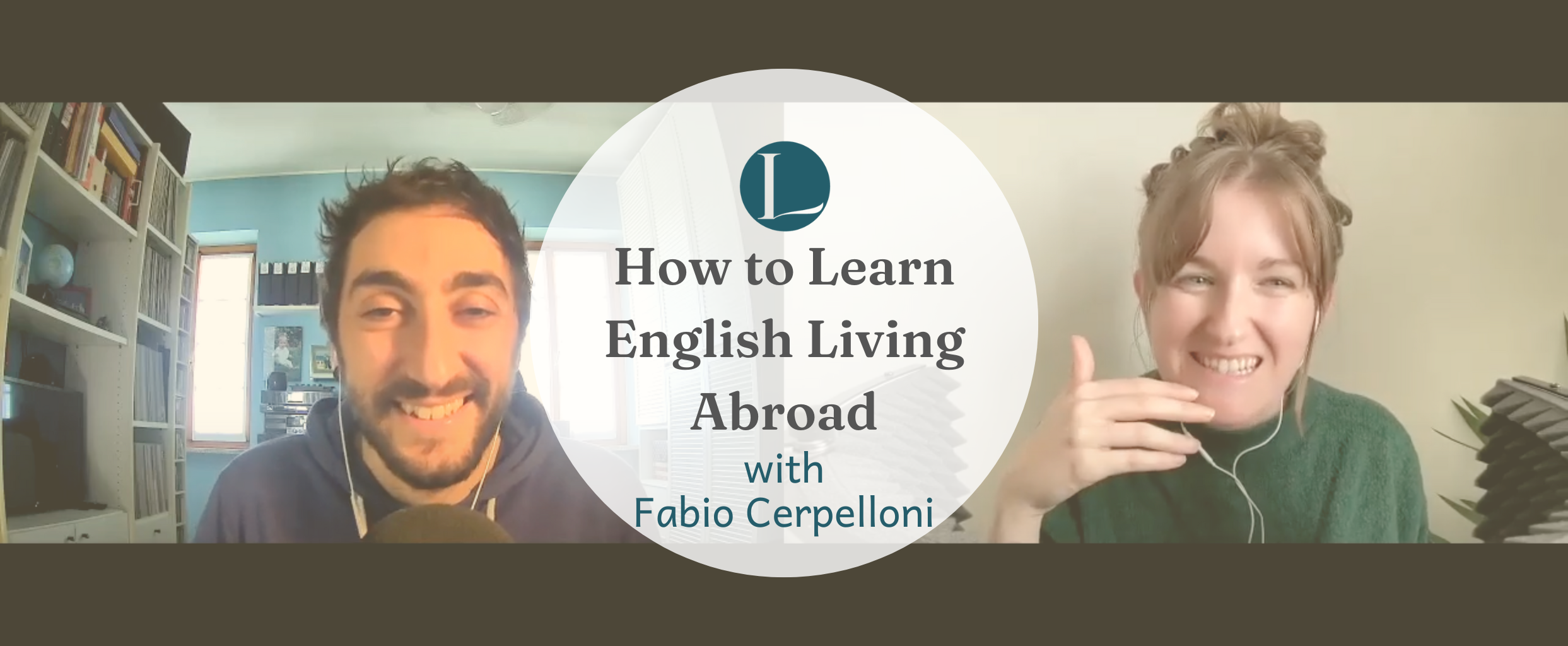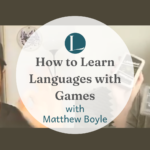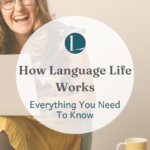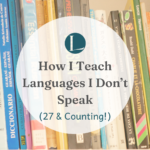Blog How To Learn A Language Podcast
May 6th, 2024
How to Learn English Living Abroad with Fabio Cerpelloni
What’s it like to learn English living abroad when you’re working? Fabio has lived and worked in multiple English-speaking countries and shares his story.
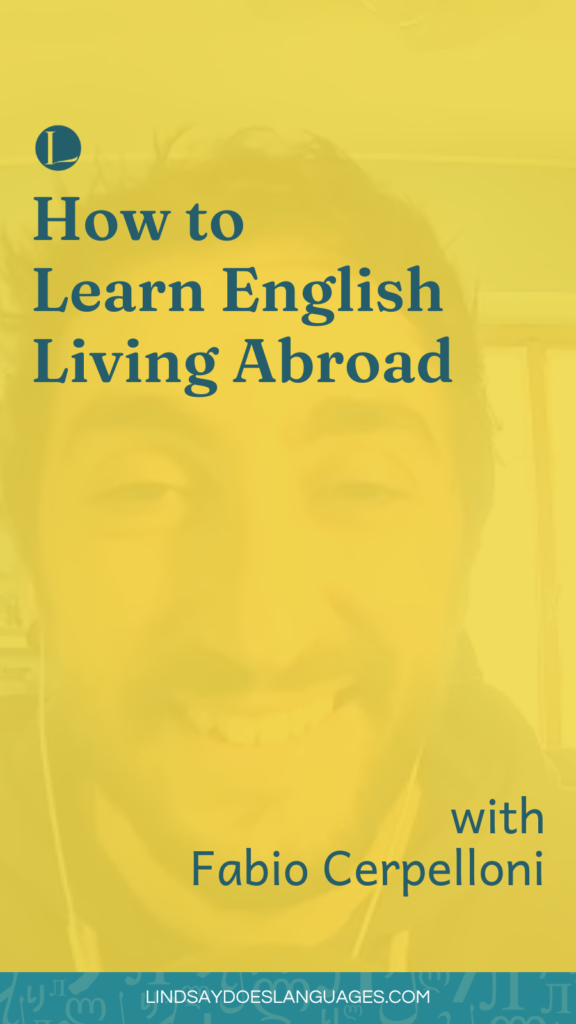
Before we begin…
The Video
The Podcast
How to Learn English Living Abroad with Fabio Cerpelloni
Links from this Conversation
Fabio’s website: https://fabiocerpelloni.com/
Fabio’s podcast – Stolaroid Stories: https://podcasters.spotify.com/pod/show/stolaroidstories
Fabio interviewing me on his podcast: https://youtu.be/1JGccYaiI8I?si=OIOZA8ObG7Lkav7-
Fabio’s book: https://fabiocerpelloni.com/any-language-you-want/
Transcript
Lindsay:
Hello, welcome back to How to Learn a Language.
This week, it is an interview episode that I recorded a good few months back now.
And this is me speaking with Fabio Cerpelloni, who is an Italian, has spent a lot of time in English speaking countries.
And so we talk about his experience learning English, what it was like and how he found that and, you know, about teaching and How to keep interested in languages and how he has managed to get to such a strong level in a language.
So yes, enjoy this episode, have a little listen.
And as always, all of the usual podcast things, subscribe, like, share, follow all of that stuff.
And I will see you very soon.
All right.
Thank you.
Enjoy.
Fabio.
Hello.
Welcome.
Fabio:
Hi Lindsay.
Lindsay:
Hi, I want to give you a little chance first of all to introduce yourself.
Fabio:
Sure, so I’m an Italian teacher of English.
I started learning English when I was in my early 20s.
I’m 36 now.
And I then started teaching English in 2015 when I got my first teaching certificate, the CELTA, Cambridge CELTA.
I teach English, I am a writer also, I’m a blogger, I love writing, writing is my happy place.
I write in English because I don’t know, actually I’ve never written in Italian, I’ve never written blogs or I only write emails sometimes and WhatsApp messages in Italian, the rest is all in English, so Articles, my academic assignments, everything is in English and yeah I’m just a teacher of
English who loves writing.
Lindsay:
Excellent.
I’m really intrigued already there’s a couple of things I want to pick up on.
It sounds like a lot of your life is lived through English in terms of work and things like that now.
When did that become a thing?
You said you started learning in your early 20s?
Fabio:
Yeah, I started learning English when I was 24. Well, learning English seriously at least, I should say.
Lindsay:
You’ve done bits in school.
Fabio:
Yeah, the usual, you know, it didn’t work, it was all grammar, it didn’t… I never spoke a word of English in class.
But then I moved to London In 2011, I had a job at Pret a Manger.
I don’t know if you’re familiar with it.
So I had colleagues from all over Europe, all over the world, and I started speaking English there.
And I realized that it wasn’t just a boring subject, you know, it wasn’t just a set of a group of grammar rules to learn, but it was actually something that I could use to make friends.
And I fell in love.
I fell in love with learning not languages, but English.
Like it was my it was my thing.
So it became my passion.
Then I realized that I could teach it so I realized that there was this course called the CELTA course and I thought wow so this is what I want to do now.
I want to become a teacher.
Then I moved to Australia.
I lived two years in Australia.
In London I spent two years there, well one year and a half.
Too busy, too like London was great but one year and a half was enough especially if you work for Pret a Manger which is like Starbucks.
Lindsay:
When you went to Australia you were like straight to the Outback, the complete opposite, no?
Not quite?
Fabio:
Well, after one month, yes, because I landed in Adelaide, I spent one month in Adelaide working in an Italian restaurant and then I went to the Outback picking mandarins and oranges You know, it was hard work but it was more relaxing.
And there in Australia I kept on improving my English.
I didn’t take courses.
I took some courses in London but in Australia I didn’t.
I used to use the grammar books, self-study books.
I used to listen a lot to other people speak.
And then I moved to New Zealand after two years in Australia and that’s where I became a teacher because I did my training course there and I started teaching English there in Auckland, New Zealand for two years.
And then I came back, I travelled a little bit in Southeast Asia for six months, and then I came back to Italy and I’m here now.
And end of fun.
Lindsay:
End of story, full stop.
And that’s interesting.
And so now teaching English in Italy, is that online?
In Italy, in person?
Fabio:
I started teaching at the British Council, Milan.
I was a full-time teacher there for four years and it wasn’t online.
Then after the pandemic hit, we all went online and I decided, okay, I want to teach online because I don’t have to commute.
I can reach not only Italians but many other people.
And I then resigned from the British Council.
I started building my thing.
It didn’t really work.
I think I wasn’t patient enough.
I tried for two years, but then now I don’t have many private clients.
I still work for universities and the British Council because I came back.
But I’m in the process now of figuring out what to do.
I really like writing, so I’m trying to find more writing gigs.
I write for, I don’t know if I can say this, but yeah, I think I can, for Olly Richards, you know, story learning.
So I’m the ghostwriter for story learning for the English part of the blog.
Lindsay:
Okay.
Interesting.
And so I’m really intrigued by, I need you to clarify the timeline for me.
So you started learning English seriously, kind of mid twenties.
What did you say?
Fabio:
24.
Lindsay:
24. When did you start teaching?
Fabio:
2011, 2015, so four years later.
Lindsay:
Okay.
Wait, how many years?
Fabio:
Four.
Lindsay:
Four years?
Lindsay:
I became a teacher at 28.
Lindsay:
Okay.
I have so many questions.
How did you go in four years from a bit of school English to deciding, yeah, I want to learn this, to then four years later feeling confident enough to teach that language?
That’s quite a short time.
That’s what I want to dig into.
Fabio:
Yeah, sure.
In 2011 my English wasn’t, you know, it wasn’t zero.
It was, I would say, B1, okay, so intermediate.
I could understand non-native speakers of English really well.
And in four years I did so many things.
Every day I would do something.
Every day.
Like watching, listening, writing.
I wrote essays just to write.
I watched TV series.
I used to watch the Ricky Gervais show, the animated podcast.
Lindsay:
Yeah.
Fabio:
TV series, I watched Breaking Bad twice with subtitles, without subtitles.
Also living, of course, I was living in English-speaking countries and I would always listen to what other people were saying, how they were saying things.
And this was a good thing and a bad thing at the same time because When you listen, you know, to the grammar of the sentence like I would replay the sentences in my mind and analyze the sentences because grammar, you know, I was good at grammar.
I studied it.
That was good because in a way I could actually see the words being spoken.
But on the other hand, I would be, you know, I was a bit too self-conscious maybe when I expressed myself.
I never suffered from a huge fear of mistakes like oh my god, but even when I spoke I would replay also my sentences and say, okay, I’ve just said this, is this correct?
Lindsay:
A lot more monitoring than you would like.
Fabio:
Monitoring all the time, all the time.
Lindsay:
Yeah.
Fabio:
But this didn’t really impact my fluency.
Not to, you know, not like some students that I’ve seen, like I’m thinking of Japanese students who, you know, as soon as they make a mistake, that’s it.
That’s the end of the conversation for them.
Japanese is just not to, you know, not to, what’s the word, discriminate, but because that’s my experience, I’ve experienced that because I taught Japanese students as well.
And I just poured my soul into it, into learning because I had a clear goal, a very clear goal.
I wanted to teach.
Lindsay:
I was going to say, what was the goal?
When did that become the goal?
Fabio:
As soon as I realized that I could teach it, like as soon as I realized I discovered the CELTA certificate, like, okay, so the CELTA certificate, because I don’t have a first degree, I don’t have a bachelor degree.
So I thought, well, I could never teach English, but then When I saw that certification, that course, open to no native speakers as well, no degree required, just, you know, good level of English.
C1 was the minimum requirement.
Wow.
And then realizing that The CELTA certificate could also open doors in real language schools, not just finding people online.
But wow, this could become a job and it lasts one month.
It’s an intensive course, which was very intensive, of course.
That gave me motivation.
I saw the enlightenment, I don’t know.
Lindsay:
Okay, yeah, I can see that then because it feels I love as well you mentioned that it’s open to non-native speakers because I think there is this don’t know the word.
Kind of a stigma or prejudice about the idea of having a native speaker teacher.
And what does that even mean?
Like, you know, you could have someone who is completely bilingual from birth or that they’ve never maybe lived in the country.
Like, what does it mean?
You know, it’s tricky to grasp.
So I love that it’s available to non-native speakers who can also, there is such a benefit to Having non-native teachers of a language because they have learned that language in the same position that you’ve been when you’re a learner, as opposed to from birth and, you know, as a child, et cetera, et cetera, where you sort pick it up more than actively learn in the same way.
Do you know what I mean?
There’s a real advantage there.
Okay.
Yeah.
I can see why that would be.
Such a goal.
So, day to day, you’ve mentioned some of the different activities that you did.
Day to day, what was the kind of short-term motivation?
Because that’s, you know, it’s a longer-term goal.
How did you keep going to get to that?
Fabio:
Well, first of all, being aware that my English was improving,
Realizing that you can actually express yourself better than two months ago.
And realizing that you’re still not there.
So I’m not there yet.
I can’t express like I would express myself in my first language.
So noticing the gaps between where I wanted to get and where I was at the moment.
And also seeing what you did before.
I think this is true In anything you want to achieve, not just in language learning, right?
If you’re motivated to get to your goal but you don’t see any improvements, like you don’t see that you’ve grown, so that could be discouraging because you think I’m doing all this work for nothing, so you don’t see progress, any progress.
But I could see the progress because I could feel it, I could feel that You know, learning a new chunk of a phrase, a new phrase or a new way of saying something, discovering words.
Also, listening helped me a lot.
I still learn words by listening.
So if you use a word that I don’t know,
And I’ve seen maybe that word 20 times in books.
The moment you speak that word, I don’t know, it clicks immediately.
Lindsay:
Maybe the last episode was definitely the last interview where I was talking about this about things that don’t instantly work for me and for me with listening I really want listening to just work like magic on its own but I need a visual to go aside it I’m always like so intrigued when people are
like yeah just listening and hearing is Ding!
And it works.
That’s so cool because everyone is so different.
This is why I like to have guests to hear those different stories.
Did you try anything that really didn’t work for you?
Fabio:
What didn’t work?
Vocabulary notebooks, they never worked for me.
Taking notes, not really.
Even when I did English courses, taking notes didn’t really help me because it was more, you know, interacting with the people, listening to the teacher, seeing things.
Writing things down is funny because I love writing.
That’s the other thing.
How come I love writing but I don’t learn by writing?
I don’t know, this is a question I should ask myself now.
Writing helps me with the thinking, like if I want to write something, if I want to research something, if I want to clarify some of my own ideas and I write, when I write I You know, it’s a way of thinking, it’s an extension of my thinking.
I think this is true for any writer, maybe, I don’t know.
But yeah, so vocabulary notebooks didn’t work, what else didn’t work?
Lindsay:
What did work for vocabulary?
Fabio:
Okay, I used vocabulary books.
I did all the exercises because I love doing the exercises, you know, the filling the gaps.
It was like doing crosswords for me.
It was fun.
But for vocabulary listening, again, it’s again that one.
Reading also, reading because I would read quite a lot as well, but The moment I hear a word spoken by a real person that validates, you know, it clarifies all the doubts, first of all, that I have about that word because, okay, if that person used it and it sounds good and no one is looking at this
person like, what did she say?
So that validates, yeah, let’s see if that word actually works and if it does then, okay, so It clicks, as I said.
So, listening.
And I was lucky in a way because I was in a native English speaking country, right?
So, being surrounded all the time by Australians, New Zealanders, British people, Yeah, yeah.
Lindsay:
I mean that immersion in itself on its own is never enough, right?
You can be in a country and just not be engaging or taking stuff in.
What did you do specifically during your time in the UK, Australia, New Zealand, to make the most of that immersion, to make the most of those opportunities of being there?
Fabio:
Yeah, well, I stayed away from Italians.
Because I didn’t want to speak English, sorry, Italian, but as much as possible, as much as I could.
Lindsay:
So if you met someone in New Zealand and they were like, oh, I’m Italian, would you rather than be like, oh, me too, would you be like, oh, I’m French?
Fabio:
No, but I have a story about this.
I actually told this story in my podcast when I was in New Zealand.
I had an Italian friend there and he wanted me to come with him to play football, soccer with other Italians that I didn’t know.
And he tried once Tried twice, I said I don’t want to come.
I didn’t say why, but I wanted to stay away from the Italian group because I felt also when I was abroad I didn’t feel Italian that much anymore.
Because I was on the other side of the world, it was a new, relatively different culture.
But then I said yes, okay, I said yes, I’ll come.
And I met the Italians, they were all like loud and very different from people from New Zealand.
But there I realized, okay, I love these people.
Like we went for pizza, we went for, like Thursday evening became my favorite evening of the week because I would play football with them and go for pizza.
And then there I realized, you know, I am Italian.
I cannot deny the fact that this is my, these are my cultural roots.
So what was the question?
Why, how did I stay away from Italians?
Well, like this, but then when I was with them, you know, it’s me.
It’s where I come from.
But in London, for example, I didn’t meet a lot of Italians.
When I was with them I would try to speak English especially if we were speaking with other people like if there were Polish people so and speaking Italian didn’t but I remember judging their English like in my mind like yeah and that I was a bit mean okay I should say um because this is what
happens in Italy people Generally judge your English because we are not good at that in general.
Like we judge politicians’ English, we judge the English of famous people, because we’re like, come on, it’s 2023, how come you still speak English with this heavy, thick Italian accent?
Lindsay:
So interesting.
So do you think the default opinion of Italians in Italy is that you’re not very good at English?
Fabio:
Yeah.
Lindsay:
Really?
Fabio:
I would say so, yes.
It all comes from the way it’s taught in schools, in the majority of schools at least.
I have my niece and all she does is she’s in school, she’s 19, All she does is exercises, they study Shakespeare, things like… Yeah, but things that are not useful to go, you know, to have a conversation with a person who doesn’t speak Italian.
I teach in a university in Milan, I teach online and all the students are B1 students None of them, like they all blame their teachers in high school for the English they have now because the way they were taught English was disastrous, useless.
Lindsay:
So fascinated to hear this because there is such a similar opinion here and I feel in a lot of English speaking countries that we’re bad at languages and we blame it on school, you know, myself included.
I’ve been guilty of kind of saying that, you know, that that’s the reason.
There’s a lot of reasons, but it’s interesting to hear it from your perspective, learning English And actually Italians feeling the same way that you’re bad at English.
Like it’s, it’s interesting.
It’s just really curious.
I wonder if anyone actually thinks they’re good.
Fabio:
Well, now I’m not the best, of course.
Well, no one should say that but I’m confident, you know, about my English.
I would never say my English is not good.
Well, I started it.
I did a lot of things.
I’m still learning things.
I still love using it.
I wouldn’t say my English is bad.
I have a colleague Who’s a polyglot, by the way.
Her name is Lara.
Her English is, I think, way better than mine.
She’s Italian.
But she’s much more obsessed than me with English.
She created a vocabulary language journal to write down all the words that she learns.
And her English, it’s better than the English of a native speaker.
I would say like you wouldn’t say she’s Italian, you wouldn’t say you would say she’s from New York probably because she’s got an American accent and actually she would be an interesting guest because she did things that I’ve never heard such stories such as you know an interesting story because she
learned she started learning when she was seven by herself like she fell in love with English at seven As you do.
Yeah well, yeah I fell in love but not at seven, I wish.
So I wouldn’t say my English is bad but it’s still not probably, I don’t know, I feel like it’s enough now, you know, I don’t want to I’m not going to obsess with new things.
If they come, of course, because when I write I still learn words, when I read, when I watch, I still learn words, but I’m not.
I feel it’s enough.
I’ve achieved my goal.
Lindsay:
I’m really, it’s really refreshing to hear someone say that because I feel the same way with a lot of languages at different levels where my Italian for example isn’t like my Spanish but I feel with my Italian like yeah that’s good enough you know when I go to Italy I can have a great time I can get
my point across and be understood same with Portuguese same with German like I don’t want to go All the way in at the deep end to see to, you know, I’m so curious about so many languages that for me, I want to spend that time then looking into something else.
You mentioned actually that at the beginning, um, your love was for learning English.
Have you learned any other languages?
Fabio:
I learnt Spanish for five minutes and then no, only English.
I tried to learn Spanish but then I thought I will never live in Spain.
I don’t feel the need to learn Spanish.
I’m not into the Spanish culture that much because it’s very similar to my culture, my own culture.
You know, I believe in letting go of goals, you know, just not just because, you know, I should learn a language.
Well, if you haven’t started, probably it’s not that important for you, I would say.
Lindsay:
Interesting, interesting.
So what was it that got you starting Spanish for all of five minutes?
Um, was it a feeling of that you should or was it that you wanted to?
Fabio:
Yeah, I was, you know, when I started teaching, if you learn another language, you put yourself in your students’ shoes in a way.
So I wanted to, um, To be in their position to see again what it’s like to learn a new language.
I took some Spanish classes in New Zealand but then when I was in class I would look more at what the teacher was doing.
Like, I could tell that she wasn’t a trained teacher, she was just a native speaker of the language with no real training.
And I would judge, again, I’m a mean person, I would judge the teacher saying, I would I would think, why is she doing this?
Why is she giving the class a list of words without a context?
Teaching techniques, I would look for how she taught Spanish.
So after three lessons I quit.
So it was because I wanted to be in my students’ shoes and also to learn a new language because once they say, once you learn one, once you’ve learned one, then it’s easy to learn another one.
So I thought, okay Spanish, it’s very similar to Italian, I wouldn’t have to struggle that much.
I bought two Spanish books I never opened them.
I bought a graded reader.
An A1 graded reader was Spanish.
I couldn’t understand anything.
It was like, what’s an A1?
Yeah, so I’m below A1.
I thought it was…
That’s interesting because the assumption is always, oh, if you learn Spanish, Italian’s easy.
If you know Italian, Spanish is easy.
Maybe easy to understand, but not easy to read, probably.
Lindsay:
Interesting, interesting.
Fabio:
So these are the two reasons why I started learning Spanish.
Arabic is a language that I like the way it sounds and I like the way Arabic people from the Middle East speak English.
I love their accent.
And I met a few people from the Middle East, I had Saudi students and they were all, I went to Morocco as well, I was there for five weeks.
I just love the The way they are, they’re very friendly, very open.
It’s probably maybe a language that I could or should or I don’t know in the future.
Lindsay:
There’s no shoulds allowed here.
We don’t have that word, should.
Because there’s so much of it already, isn’t there?
I should learn another language, I should learn it to that level.
Fabio:
Yeah, either go for it or get rid of it.
Yeah.
If, if, if that’s what you want to do, go for it.
If it’s not, no pressure.
That’s the way.
Lindsay:
Interesting.
So in terms of English now, you’ve been teaching it for a few years.
You’re using it in work all the time.
How, is it something that you feel that you’re still, I know you mentioned not necessarily wanting to improve, but do you still feel like You’re learning, do you still intentionally learn?
I think is what I’m trying to ask there.
Fabio:
No, intentionally no, but all the books that I read are in English, so when I read books I still have my dictionary app on my phone, I’m always using the dictionary.
When I write articles, when I write on my blog, I need the dictionary.
I’m still looking for ways to express my ideas in the best possible way.
Is it passive?
I don’t know.
I think it’s just learning integrated with what I do.
It’s not, okay, today I’m going to learn Five new words.
No, I don’t do that.
Today I’m gonna read a book and see maybe I will learn a couple of new words.
If not, maybe tomorrow.
That’s my approach now.
Lindsay:
Yeah, it’s so interesting, isn’t it, how that sort of shifts and changes as you get more advanced in a language where I’d say typically the learning does become less sort of actively intentional and more, like you’re right, passive isn’t quite the word because you’re still doing stuff, but it’s not
the core focus to learn.
Sometimes I get frustrated when I, like I was reading a book and I couldn’t understand Because I don’t read fiction, okay?
I think I would struggle with reading fiction because the language is so colorful, you know, so many adjectives.
I mean, the default advice of if you like Harry Potter, read Harry Potter, but then all the way, like wand, wizard, like that’s not everyday.
Yeah.
Fiction, it’s very sort of poetic license to play with language a little bit more.
Fabio:
So most of the books that I read, well, 95% of the books that I read are in English and they are all non-fiction.
So when I read a book, I was reading a book, a fiction book, and I was like, why?
I can’t understand this.
How come?
I’ve got, you know, I’ve got the C2 proficiency in English.
I’m my teacher.
I’ve been, you know, I lived in English speaking country and now I’m reading a book and I can’t understand it.
Why?
Do I still have to learn?
How long will it take me to get to that level where I can understand this book?
But then, you know, there are limits.
Again, it’s like you said, if it’s not working, just let it go.
Lindsay:
Exactly.
Yeah.
Fabio:
And it’s not that important, you know, it’s not that important.
If I had to write fiction and, you know, write for, like review fiction books, then, you know, okay, I need to improve my English even more, but for now it’s enough, it’s enough where I am.
Yeah.
Lindsay:
And you wrote a book yourself as well, right?
Based on your experience learning English?
Fabio:
Exactly, yes.
So the book is called Any Language You Want and it’s a collection of 18 stories, personal stories of how I learned English.
In every story I explain what’s the best way to learn a language so I tell the reader when I was in London I did this, this and that and one day this happened blah and then I say okay do this you know don’t take English class take language classes I don’t talk about
English well I talk about English because it’s the language that I learned but it could be applied to any language any language you want that’s the title Do this, so take language classes because how can you learn without taking classes?
You need someone to support you, you need someone to explain, you need someone to mentor you, to help you, to show you how to learn.
This is how to learn a language.
But in the next chapter, I tell another story about what I did in Australia where I took no classes.
I was doing everything by myself.
So I say, when I was in Australia, then I tell the full story.
And I say, no, you shouldn’t take classes.
People who tell you to take classes don’t believe these people because You can learn a language by yourself.
Learning happens without teachers and learning has no geographical boundaries.
You can learn in your room where you are.
You don’t need to go to Spain to learn Spanish.
This is how to learn a language.
So in every chapter I contradict, every chapter contradicts the next or the previous one.
Lindsay:
And is it every chapter is Contradicting it in the sense of then it’s ruling it out completely and by the end there’s an answer or is it just to showcase the different ways that we can learn?
Fabio:
Well, there is a conclusion, which I’m not going to…
Lindsay:
No, of course, don’t share now!
No spoilers!
Fabio:
Well, it’s not that big but anyway, it’s to, as you said, it’s to show that there are many different ways to learn a language and The idea that inspired this book, it came from my frustrations when I see YouTubers, teachers, language coaches, polyglots who say, you know, keep a vocabulary notebook
when they give advice.
It’s good advice, of course, But the opposite of that advice is also true.
Maybe you don’t need to take a vocabulary notebook.
And the problem with the internet, with people on the internet like me and you, when we give advice, we don’t really know who’s listening to us.
So in the introduction of my book I say, There are YouTubers who say don’t worry about grammar, forget about grammar, like focus on conversation, focus on speaking because language is all about communication.
When you’re in the real world you don’t need, you know, you don’t go in the real world doing gut-filled exercises, you need to speak.
That’s true, of course, but the opposite is also true because my girlfriend, for example, she has a level of English which is like B2 C1.
She makes mistakes and she says, I don’t know why I make these mistakes.
I know that I make mistakes.
But I don’t know why.
If you ask me why do you say this instead of that or why did you make that mistake or this other mistake, she wouldn’t have a clue.
So That advice, that piece of advice that, you know, don’t worry about grammar, that doesn’t apply to this situation because she would need grammar.
Maybe now it’s the right time if she wanted to improve her English, she doesn’t want to, but if she wanted to it’s time to buy a grammar book, sit down, read, study the rules and that’s how you could maybe, maybe become more accurate.
So We don’t know the specific situation and in my book I basically keep contradicting myself because you can select the situation that applies to you.
Lindsay:
I like that structure.
It’s very central to the way that I work as well in that when I work with people in Language Life, which is the whole core Concept of the program is that you’re learning how to learn a language in ways that work for you specifically.
So it’s not me saying, have a recap notebook, learn the grammar, like do this, and this, and don’t do this, and this.
It’s me giving you the broader picture and understanding of how it actually works so that you then have the knowledge and skills to then apply everything yourself, you know?
And that is so much more enriching than do this, and this, and don’t do this, that, or that.
It’s like, cause I feel as well, there’s, there’s a danger of that then becoming very overwhelming where you think, okay, I’ve got my answers from this one YouTube video, let’s say, and you feel like, yep, I’m going to try it.
I’m going to give it a go.
It doesn’t work for you.
And then you feel like, okay, I’m the problem.
The amount of times that happens, I hear this from people, you know, where they think, well, I am not a language person.
And so it’s, it’s quite frustrating, but it’s also saddening because we are, when people say I’m not a language person, they’re doing so they’re communicating that through language.
So we all have this ability if you’re able to state that fact.
Right?
And yeah, it’s just, I really appreciate when someone is open to that type of contradiction, that type of, you know, not feeling that, you know, Fabio, you’re not feeling obliged to stick to this is the way, this is the system, this is the method.
Fabio:
Yeah, and that’s why the best advice I could give to a language learner is to question all the advice they get.
So, okay, they say this, let me try it.
Does it work?
No.
So, next, next tip.
Let’s see if the next thing could work.
But as you said, it’s true, like, now there is this thing, this trend that grammar is not important.
Why?
Language is made of grammar, like it’s a component of language.
So why would you say don’t study grammar?
Learn English, like there are advertising campaigns or schools, learn English effortlessly without studying grammar.
No stress English without, you know…
Lindsay:
But Fabio, you know what?
That messaging goes back to what we said at the very beginning about people’s experiences in school.
Fabio:
Yeah I was actually thinking about that because this happens a lot in Italy that’s why there could be a good product that could be successful because okay I studied English, I studied the grammar in school and it didn’t work so now English without grammar yes that’s where I’m going now.
Lindsay:
True yeah.
Fabio:
Yeah it’s very true.
Lindsay:
Finally, we’ve put the world to rights.
Fabio:
Sorry?
Lindsay:
We’ve put the world to rights.
Fabio:
Yeah, yeah.
We’ve done it.
Yeah, I hope that, you know, with this book I’m not planning, I wrote this book because I wanted to send out this message of how I learned a language because in those 18 stories it’s what happened to me.
I also know a little bit about language acquisitions because I then did my Celta, I’m now doing a master’s degree in language education, so I also know a bit of the theory, the methods, the past of How languages were taught and learned.
Now, in this book, there is some science, but it’s not explicit.
If you know what the comprehensible input is, then you will see it in the story, but it’s not expressed like learn a language through the comprehensible input.
It’s all…
Lindsay:
…understated.
Fabio:
Understated.
You see, I don’t have these little words here, like understated.
It might not be the exact word to be fair, but I feel like it’s hidden.
It’s hidden in the story.
Lindsay:
Yeah.
Oh, that’s brilliant.
If people are listening and they’re like, yes, this sounds amazing.
I want to get my hands on a copy.
Where can people get the book, Fabio?
Fabio:
Yeah, it’s on Amazon.
They can go to my website to find the link to Amazon.
It’s called Any Language You Want, 18 conflicting stories, 18 conflicting lessons for a new kind of language learner.
So there they can find it.
It’s in Kindle, like ebook and And paper copy as well.
Lindsay:
I’ll pop the link in the show notes as well of course.
Fabio:
Yeah, thank you.
I’m now in the process of getting out there and see what happens.
I’m not planning, of course.
If I get a couple of bucks for each copy that I sell, I have to pay tax on it.
So it’s not going to be Harry Potter or anything.
But it’s a good product, I think.
Did I sell it?
Lindsay:
I would argue you talked yourself down!
Well, thank you for sharing a little bit about your story Fabio and explaining about the book and the concept behind it.
It sounds really, really interesting.
And like I say, the link will be in the show notes for people and the link to your website as well.
Is there anything else you want to add before we wrap up?
Fabio:
Uh well you’re gonna be on my show as well so um yeah it’ll be a pleasure to yeah because I have a podcast there um on my it’s on my website as well it started as a language learning podcast then after a few episodes I you know I got bored of The language learning topic.
So I started interviewing other people and I now call it a personal development, real story podcast where people can, you know, find some inspiration.
That’s it.
Lindsay:
Excellent.
Well, thank you very much.
It’s been an absolute pleasure to speak with you.
Fabio:
Thank you, Lindsay.
Lindsay:
We will speak very soon on your podcast.
Fabio:
Sure.
Can’t wait.
Lindsay:
Thank you.
Bye.
Fabio:
Bye-bye.

